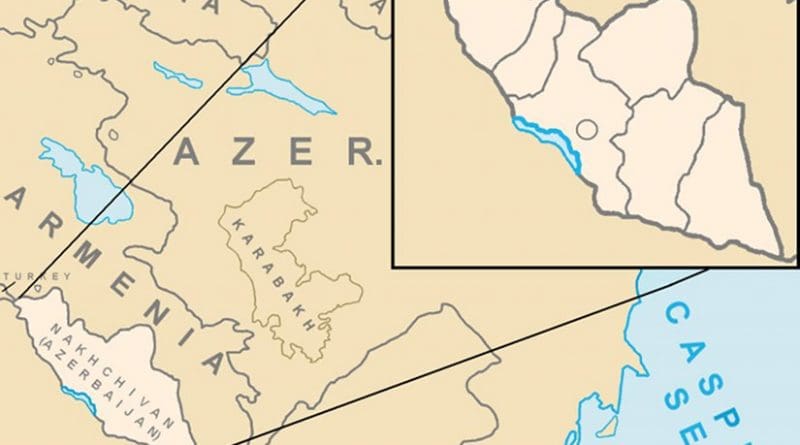Nakhchivan Promotes ‘Azerbaijani Multiculturalism’ As Valuable Source Of World’s Intercultural Dialogue – OpEd
By Peter Tase
On October 24, 2017, the Nakhchivan Teachers Institute hosted a presentation of a university textbook on “Azerbaijani Multiculturalism”.
At the event, the Vice Chancellor of the Institute on Educational Curriculum Prof. Dr. Akif Imanli stated that the topic of multiculturalism has been taught at higher educational institutions for some years and this university textbook of “Azerbaijani Multiculturalism” is a great asset to both teachers and students in the study of this field. The chief of Analytics Department of Baku International Centre of Multiculturalism Dr. Rashad Ilyasov spoke about the textbook “Azerbaijani Multiculturalism” and noted that “the chapters of this volume contain a broad information on multicultural security in Azerbaijan’s internal and external policy as well as includes literary-artistic sources of multiculturalism in Azerbaijani culture.”
The Corresponding Member of the National Academy of Sciences of Azerbaijan Artegin Salamzadeh emphasized that: “multiculturalism is a lifestyle and a state policy in Azerbaijan. It has no alternative. Today Azerbaijan is presenting to the world its rich model of multiculturalism that has passed through the filter of many centuries. In this field our country has a rich experience based on ancient history.”
Indeed the Autonomous Republic of Nakhchivan (Azerbaijan) is a laboratory of multiculturalism and an important archeological source of special significance to the world. The land of Ajami ibn Abubakr Nakhchivani and of Prophet Noah has many archeological sites that are a perfect testimony to Azerbaijan’s ancient multiculturalism values and inter-religious dialogue. Under the leadership of Chairman Vasif Talibov, the Autonomous Republic of Nakhchivan has made a great progress towards preserving ancient artifacts and potteries on archaeological sites and cultural monuments that pay a special tribute to Azerbaijani women and religious tolerance.
During the book promotion event, was analyzed the study of the historical, cultural, political, and social essence of Azerbaijan’s traditions of tolerance. The keynote speakers analyzed the foundations of tolerance, religious diversity in the Republic of Azerbaijan and effective public policies that directly affect the vibrant cultural fabric of the Land of Fire.
Furthermore the religious monuments have acquired a special priority in the policy of Azerbaijan’s multiculturalism. The textbook “Azerbaijani Multiculturalism” plays a huge role and is a valuable source in encouraging multicultural values to the young generation.
The “Azerbaijani Multiculturalism” textbook consists of an Introduction, three sections and seven chapters. This volume is intended for university graduate students in Azerbaijan and abroad who attend the course on “Azerbaijani Multiculturalism”, as well as those who are interested in the basic issues of the model of Azerbaijani multiculturalism. The book has over 40 co-authors including some international contributors. This textbook is the outcome of joint efforts of outstanding scholars in Azerbaijani history, literature, philosophy, law, psychology, Azerbaijan’s modern policy, language, ethnography and international relations.
The first section of this textbook covers the methods of the course on “Azerbaijani Multiculturalism”, and its correlation to other social sciences; the second section introduces multiculturalism as Azerbaijan’s state policy and its people’s lifestyle, it also analyses “Multicultural Security and Its Main Principles” as well as “the Azerbaijanism and Multiculturalism”; the third section presents some important points on multiculturalism in Azerbaijan’s foreign policy (this section shows multiculturalism as a factor of the country’s successful foreign policy, it analyses the initiative of “Baku Process” that has lately entered the political lexicon and implies the development of a dialogue among different cultures).
As the Republic of Azerbaijan fosters a multiculturalism policy at the national and international levels and is a key player to preserving peace in the world; the Republic of Armenia continues to occupy over twenty percent of Azerbaijan’s sovereign territory, including the Nagorno – Karabakh region and its seven surrounding districts. Only in February 2018, Armenian Armed Forces violated the ceasefire 3,423 times on various directions along the line of contact between Armenian and Azerbaijani troops. The Armenian Troops have been using large-caliber machine guns and sniper rifles while attacking the Azerbaijani army positions.
The government of Armenia has ordered its troops to shell the Azerbaijani army positions in the districts of Gazakh, Tovuz, Aghstafa, Gadabay, Tartar, Agdam, Khojavand and Fuzuli. Meanwhile the Azerbaijani Army had a full control of the situation through the entire line of contact.
In February 2018, was prevented another provocation by Armenian Armed Forces in the direction of Azerbaijan’s Gazakh district. An Armenian sabotage group in a UAZ vehicle was detected in time and their reconnaissance mission was crumbled; once again the preventive actions of Azerbaijan’s troops prevailed.
Furthermore, an Armenian quad-copter was intercepted while attempting to carry out flights over the Azerbaijani army positions in the direction of Fuzuli district.
The Nagorno-Karabakh conflict entered in an intensified phase when the Armenian SRR made territorial claims against the Azerbaijani SSR in 1988. Immediately thereafter a fierce war broke out between Azerbaijan and Armenia over the Nagorno-Karabakh region of Azerbaijan.
As a result of the war, Armenian armed forces occupied some 20 percent of Azerbaijani territory which includes Nagorno-Karabakh Region and seven adjacent districts (Lachin, Kalbajar, Aghdam, Fuzuli, Jabrayil, Gubadli and Zangilan), and over one million Azerbaijani citizens became refugees and internally displaced people. The military operations finally came to an end when Azerbaijan and Armenia signed a ceasefire agreement in Bishkek in 1994.
Since then the Armenian Government and its terrorist political leadership have violated the UN Security Council Resolutions 822, 853, 874 and 884, that were passed in 1993, and continue to grossly violate other resolutions adopted by the UN General Assembly, PACE, OSCE, OIC, that pressure Armenia to unconditionally withdraw its troops from Nagorno-Karabakh a sovereign territory of Azerbaijan.

